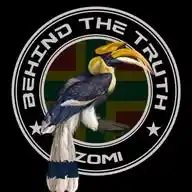
𝔹𝔼ℍ𝕀ℕ𝔻 𝕋ℍ𝔼 𝕋ℝ𝕌𝕋ℍ (𝔹𝕋𝕋)
February 1, 2025 at 03:09 AM
*Day 13: The Philosophy of Land*
For the _Zomi_, land is far more than a mere possession—it is the heartbeat of their identity, the canvas of their history, and the guardian of their future. The Zomi connection to the land transcends the physical; it is spiritual, deeply intertwined with their cultural heritage and survival. To understand this bond is to grasp a fundamental aspect of what it means to be Zomi.
The spiritual significance of land is equally compelling. The _Tual_, or central sacrificial platform, was believed to hold a spiritual influence extending over the entire village. Rituals performed here were acts of communion with the spirits believed to inhabit the trees, rivers, and mountains. The land was not just inhabited; it was animated by the presence of these spirits, demanding respect and careful stewardship. The land and its features—the trees, rivers, lakes, and wildlife—were populated by various spirits who impacted the community's life.
In _Zomi_ culture, the land is revered as a living entity infused with spiritual significance. Every hill, forest, and river carries stories of ancestors, battles, and sacrifices. Practices like _jhum_ (shifting cultivation) are not just agricultural methods but acts of stewardship, reflecting deep ecological wisdom. Each year, families clear the forest, burn the undergrowth, and sow seeds, following a rhythm set by the seasons and guided by respect for nature. As described, *"The cultivation extended to the limit of the village boundaries, and every inch from the mountain top to the valley bottom would in its due sequence come under the hoe."*
This sustainable approach ensured the land remained fertile, allowing the _Zomi_ to thrive despite the harsh terrain. Villagers saw themselves as custodians, not owners, of the land—a view reinforced by rituals and taboos that protected sacred groves and ancestral sites. For instance, certain trees, like the _Singkol_ and _Sing Lusum_, were considered sacred and never cut, believed to be the dwelling places of spirits. This respect extended to all aspects of nature, forming a holistic relationship that integrated the Zomi's spiritual beliefs with their daily survival strategies.
The land also held a communal dimension. Traditionally, land was not individually owned but collectively managed. The _Hausa (chief)_ oversaw land distribution among villagers, a practice reinforcing social bonds and mutual responsibility. In return, villagers offered tributes like _tangseu or buhsun (portions of harvested grains)_, which were redistributed during communal feasts, symbolizing a cycle of giving and receiving that sustained the entire community.
However, the relationship between the _Zomi_ and their land was not without conflict. Colonial and post-colonial interventions disrupted traditional land tenure systems, introducing private property concepts that clashed with communal practices. The imposition of external laws and the arbitrary demarcation of boundaries by colonial powers often resulted in the loss of ancestral lands. Yet, the _Zomi_ resisted, asserting their right to land as a fundamental aspect of their identity. As observed, *"The Zomis' attachment to their land is not merely economic—it is a deep-rooted expression of their collective identity and adaptability”.*
Modern challenges continue to threaten this relationship. In some regions, government policies and commercial interests have encroached on traditional lands, categorizing them as 'vacant' or 'fallow' to facilitate resource extraction. Despite these pressures, the _Zomi_ community remains vigilant. Village councils now play a crucial role in managing land resources, blending traditional practices with modern legal frameworks to safeguard their heritage.
The _Zomi philosophy_ of land teaches us that land is more than a commodity—it is a living narrative of a people's journey, struggles, and resilience. It reminds us that our relationship with the earth is reciprocal; we are caretakers and beneficiaries. In a world increasingly driven by short-term gain, the _Zomi_ perspective offers a profound counter-narrative that values sustainability, reverence, and community.
*Reflection:*
How does our relationship with land shape our identity and values? Can the _Zomi_ philosophy inspire us to rethink our connections to the environment?
*Quote to Highlight:*
*"To the Zomi, the land is not something to own—it is something to honour."*
BTT
🔴🟡🟢
❤️
👍
😂
😢
🙏
49